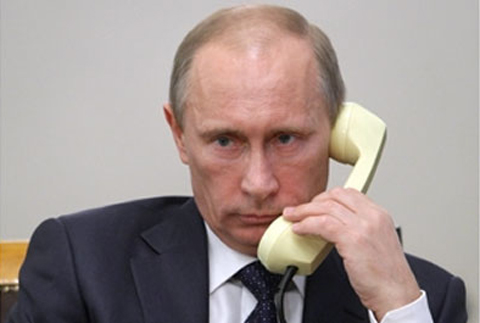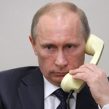
West Pushes and Eases Putin Toward a ‘Diplomatic Solution’ in Ukraine
Publication: Eurasia Daily Monitor Volume: 11 Issue: 142
By:

Bad news hit the Kremlin thick and fast last week, but on Friday evening (August 1), President Vladimir Putin answered a phone call from US President Barack Obama, who again stressed that the Kremlin’s mounting problems can be resolved diplomatically (whitehouse.gov, August 1). Putin’s personal responsibility for the war in eastern Ukraine is apparently no longer up for discussion. Meanwhile, the West—after having vigorously mobilized a political effort to enforce far tougher sanctions than Moscow had budgeted for—is seemingly granting him an “honorable” way out. In Washington, and even more so in Berlin, there is understandable reluctance to heighten Putin’s desperation and to push him into a corner where further domestic mobilization against the “hostile” North Atlantic Treaty Organization (NATO) would be his only choice (Gazeta.ru, July 28). And yet, risk remains that Putin may be interpreting every offer for a compromise solution as a sign of weakness or as a trap aimed at undermining his credibility. Therefore, Obama did not hide his doubts about his irrationally thinking counterpart’s response to the West’s diplomatic message (RIA Novosti, August 1).
While Obama is focusing on sanctions, it is not clear at all whether they have made any impression on either Putin’s courtiers, who have had ample time to hedge against the squeeze, or on the lone “decider” in the Kremlin, who disregards economic matters as barely relevant to the fast-moving crisis (Slon.ru, August 1). It is the financial sector that has been hit hardest in this latest round of escalation. But Russia’s bankers have useful back channels to the Central Bank (which is not sanctioned) and have good reason to expect that, in three months’ time, the Western restrictions will be eased (Forbes.ru, July 30). Far more shocking was the decision of the Permanent Court for Arbitration in The Hague to award the Yukos shareholders some $50 billion in damages, altering the whole international context of the old case, which is of great personal importance for Putin (Novaya Gazeta, July 30). It was followed by the decision of the European Court of Human Rights to penalize Russia by another $2.5 billion for bankrupting Yukos through excessive tax claims (Gazeta.ru, July 31). Unlike sanctions, these decisions cannot be lifted, and appeals have slim chances to succeed—while refusing to pay will put Russian state corporations under risk of losing their European assets.
Most likely, Putin perceives these legal defeats as a direct continuation of Western pressure on Russia (Vedomosti, July 30). Furthermore, he probably understands that Moscow’s plan for “freezing” the conflict in Ukraine is failing because the Ukrainian army is continuing its successful offensive; only a deployment of Russian battalions can seemingly preserve some sort of “Novorossiya” (“New Russia”—Moscow’s project to install a pro-Russia regime in southeastern Ukraine) in Donetsk and Luhansk (Slon.ru, August 1). He is perhaps even prepared to wash his hands of the hapless rebels, though letting these war bands retreat into Russia would be an unfortunate element of a “diplomatic solution” (Polit.ru, July 30). In this “game over” situation, continuing cross-border artillery barrages and further deliveries of heavy weapons to the separatists might appear irrational; but it is apparently important for Putin that a “heroic” defeat of the rebels not turn into a rout.
What departs even further from rational behavior is Moscow’s stance on the Intermediate-Range Nuclear Forces (INF) Treaty (1987), which Russia has chosen to violate with the test of a new land-based cruise missile (RBC Daily, July 30). Obama raised this issue in last Friday’s phone conversation with Putin, but the official Russian transcript contains no mention of it; the mainstream media, on the other hand, is full of denials while also denigrating the allegedly outdated treaty (Rossiiskaya Gazeta, July 30). The Kremlin may have discovered that the huge investments necessary to upgrade Russia’s strategic forces make no difference in the Ukrainian calamity and yield no dividends in Russia’s deepening confrontation with the West. Rather, the attempts to put into play various non-strategic capabilities—from the Iskander missiles to tactical nuclear warheads—could aim at gaining some position of military strength and splitting the NATO alliance’s unity in upholding the European order (Nezavisimaya Gazeta, July 30).
Obama cannot postpone dealing with Russia’s INF Treaty non-compliance. But the fact of the matter is that he also cannot open for Putin a sufficient face-saving way out of the quagmire that the Kremlin is sinking into. A “diplomatic solution” might sound nice, but Putin knows that his “reward” might only be the lifting of some of the sanctions. And he can no more accept the verdicts on the Yukos case than he can begin to contemplate abandoning Crimea (Ezhednevny Zhurnal, July 31). This self-entrapment in a chain of old mistakes and new blunders reinforces the Kremlin’s vision of approaching global catastrophe in which conspiracy theories blend with fears of revolutions and worries about corruption investigations (Vedomosti, August 1). Such premonitions of a war that would eliminate all the current problems came through clearly in Putin’s speech at the opening of a monument to the heroes of World War I. According to the president, Russia entered WWI—in his interpretation—in order to defend a “brotherly nation” and was heading for a victory that was “stolen” by internal traitors, which “betrayed national interests” (Moskovsky Komsomolets, August 2).
This train of thought is certainly going in a dangerous direction. And Obama together with German Chancellor Angela Merkel and other European leaders are seeking to divert it to the track of manageable “co-existence.” Putin, however, can likely see only further setbacks on this track: a probable decision on gas prices from the Stockholm Arbitration Court in favor of Ukraine, and a conclusion of the European Commission probe into Gazprom’s abuse of its monopolistic position that would slam Russia with another penalty worth billions of dollars, among others. A Ukraine recovering from war and insisting on its European identity will be further proof of Russia’s degradation under a corrupt regime that squanders its riches and hides behind “patriotic” boasting. The West, on the other hand, cannot convince Putin that the ultimate goal of the sanctions and censure is not the downfall of his regime via the sowing and feeding of internal unrest. The Russian head of state will fight tooth and nail for his survival—but he still can be dissuaded from doing it using tanks and missiles.




